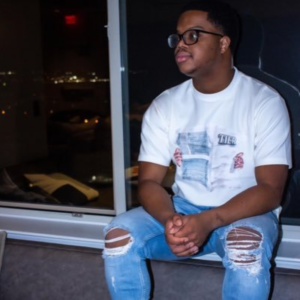
By Sean Sukonniks, Research Analyst at King’s Private Equity Club
Russell Harris (@VCRussell on Twitter) was a student back in Delaware several years ago, with a good, but not inspiring career ahead of him as a hedge fund analyst (”hedgie” as he calls them). It all changed in 2022 when he decided to get off the beaten track and try himself in a Venture Capital market. Now Russell Harris tries himself in a VC field, and also has started a “100 days in VC” thread on Twitter, where he shares insights on how his Venture Capitalist adventures go – it ranges from people he meets to the interesting opportunities on a market and insights from a first-time worker.
Underneath is the interview with Russell, where he opens up about his story, the role of mental health, and the importance of “jumping the gun” and just doing instead of thinking about doing.
 Source: @VCRussell
Source: @VCRussell
“Tell me a bit about your background. What did you do before VC?”
“I graduated from university in February 2020 with a degree in economics and analytics. What’s weird about that time is that you graduate, and the world ends. I got a job at JP Morgan as a hedge fund analyst. And remember the day that the stock market basically crashed, and I was two weeks into my office, and I was like, “Okay, what’s next?”. So I ended up working there for 10-11 months and then got let go.
I wanted to get into real estate. One thing I did during COVID was that I used some skills learned in college too. With 2 of my best friends, working in the DC area, we capitalised on people who still have to pay mortgages. I got my hands on some Airbnb API to make it work. Fast forward, I asked if they can bring me on a full time, but they had no budget, but one of them told me to look into clean energy.
I started, and I realised there’s a disconnect between farmers getting out of business and solar developers, and I saw an opportunity there. I dove deep into that and now can tell you anything on the topic, but essentially I went back to one guy who helped me and proposed a solution to him without copyrights. He ended up stealing my idea and capitalising on that, and now currently gets x3 profit on that. At this point, I’m 4-5 months out of a job, spending my savings, and I understand that it’s not gonna work. I felt like I failed life, I was depressed, but my girlfriend got me through it and helped me find a job as a data analyst.
Everything was good in theory, but I realised that I missed socialisation and interaction with people. So I was like, “how can I do that and still invest?” And that’s how I started going to pitch competitions, started following people on Twitter, and trying to figure out how did they get into VC. And there’s that stigma that getting there is hard, and yes, it’s a challenge, but a year ago today, I had 15 dollars in my bank account, so this moment in my life right now shows that everything is possible. So I really wanted to put people in a situation where if they have a good idea like I did, I can help them without getting screwed over.”
“How did you come up with the “100 days” idea on Twitter?”
“My girlfriend. She’s a brand strategist for some great people, and I told her that VCs have some great brands for them, and she said that brand recognition is essential and opens doors for networking. There’s a thing for “100 days in code”, which got popular over COVID, and I’m like “If I just tweet 5 days a week for the VC, people gonna see that I’m growing”. And I realised that these big VC people don’t have time to teach me this and that, you gotta figure it out yourself. So I just tweet my understandings and questions, thus building my network and seeing people answer me in their spare time. Still, to me, I don’t feel like I’m anything in the space – I haven’t done any investments yet, so just seeing so many people watch my journey is kind of cool.”
“What is it that you are currently doing exactly?”
“Right now, I’m a fellow at Score3 ventures, and 1st thing I did was that I worked with a PE firm wanting to transit into the venture space. So I had a unique opportunity to interview a whole bunch of GPs and their funds to evaluate them for compatibility with our PE client. I got a chance to talk to people who wouldn’t take my meeting any other way, and I had a chance to do a little self-promotion aside from my main line of inquiry. I got to learn a lot about different strategies and how due diligence is done.
Right now, we’re heading to the phase of fundraising, and we gonna deploy the capital soon. Also, at Score3, we run syndicates. We find underrepresented founders in areas that aren’t thoroughly represented here on the coast (north-east USA), and even if they aren’t here – a good idea is a good idea. We try to get people funded in cases when they couldn’t get funded otherwise, and it took off quite well. I was the head of inbounding, so everyone coming up with an idea had to come through me – getting off work from 5 and taking calls till 10 was my routine. I went through probably 70 founders in about 2 months – every day at work, I had to put different hats on. We’ve been able to take some through the later stages of due diligence, others got subscribed somewhere else through my network. So that was a great experience too.
Aside from that, I got into the firm “Going VC,” where we’re learning strategies on how to become a venture capitalist – both textbook stuff and new practices.”
“For a VC in 2022, is it important where you work? Do you need to be in the big tech hubs, or can you work in the remote areas?”
“I ask myself that a lot: “What if I was in Silicon Valley?” DC, where I now am, is an emerging market, and there are a lot of remote positions that are still developing. And I believe that as long as you put the work in and remain being seen, especially in 2022, where we now speak via Zoom, you have an opportunity to work anywhere. It’s about what are you willing to do, and whether you’re okay to travel – I know that I’d have to travel a lot to visit events and shake hands with people.”
“One thing I hear is that there’s no logical way to get into VC, lots of people say that you have to “be proactive.” Would you say that it works, or is there something else to it?”
“I think that a perfect example is my friend Anthony: he’s a VC from around here. I talked to him in January, saying: hey, can we chat? We had a phone call, and in the first conversation, he was very generic with his advice, so I asked about something more specific. He told me: do more, and I’d be able to help you more. So I come back to him in 4 months, saying, “Hey, that’s what I did in that time”. He immediately came back to me, saying, “well, you’re doing a lot, I actually want to help you now”. I think that in the space, it’s a really fantasised position, and that’s great, but if you want to go and make money, you’d better just go to a hedge fund, like I did prior.
With that, I think that if you’re able to provide value and make connections, that’s good. I don’t write checks – even if I like company up and down, rating it well on a report is as much as I can do. It’s about “okay, who can I send this deal to based on their investment thesis?” Especially if you work across to other analysts and associates, if somebody is raising another fund, somebody’s going to say, “Hey! There’s that guy Russell who brings in deal flow. We should think about him”. If you just apply on LinkedIn without trying to get people and who they are, you are going to have hard times. It’s important to understand that hiring you in the VC world means deducing this money from someone else’s salary – unlike at big funds and institutions, your pay is actually felt by an entire company. You have to prove your worth to people who you take money from.”
“VC is a big chunk of hard and soft skills. So who would win in a theoretical battle between networking and hard skills on early-stage investment?”
“I think those subject matter experts are really valuable, but you don’t have to be one to be a VC. If I’m just concentrated on one subject really good, like logistics, then I’m valuable because of your knowledge in logistics. But you have to stay in this lane forever. And I feel like being that networker who can help whomever via knowing somebody makes it a lot more beneficial, especially in the early stage. Your deal flow is a wide variety, so you can navigate founders, especially at a young age.”
“Another question based on skills, especially given your background: which hard skills do you use the most as a VC?”
“Modelling. You have to make models and calculate different markets or even create those. To me, it’s kind of fun. I think that this and being able on your feet with math is very important – say, somebody says they’re raising $10m at a $90m pre-money, you know that post-money it’s $100m, and you’re getting 10%. And it’s important to do it quickly and correctly.”
“You want to be quick at non-complex maths?”
“Yes, that’s right.
“What would you say to the young VCs? To people who want to get into the field?”
“Just work. “You gotta try,” that’s my motto. You are going to hear a lot of no’s and some “oh, you’re doing the right thing,” and then you’d think “Okay if I’m doing the right thing, why wouldn’t you hire me?” But don’t get discouraged – every “no” is a lesson in how to get better. I’m nowhere near perfect – every day, I wake up, and after my 9-5, I think, “how can I become a better investor today.” Connect people, go to every meeting you can, and it all will be good.”
Russell was giving the interview amidst his working routine, and by now hasn’t tweeted anything new for the past few days, so it’s tough to say how is his journey right now. it is always a good possibility that he’d come back to Twitter and will be discoverable again.
